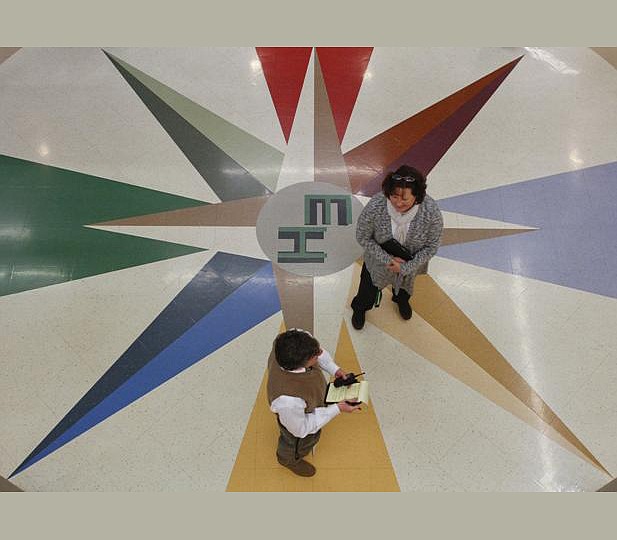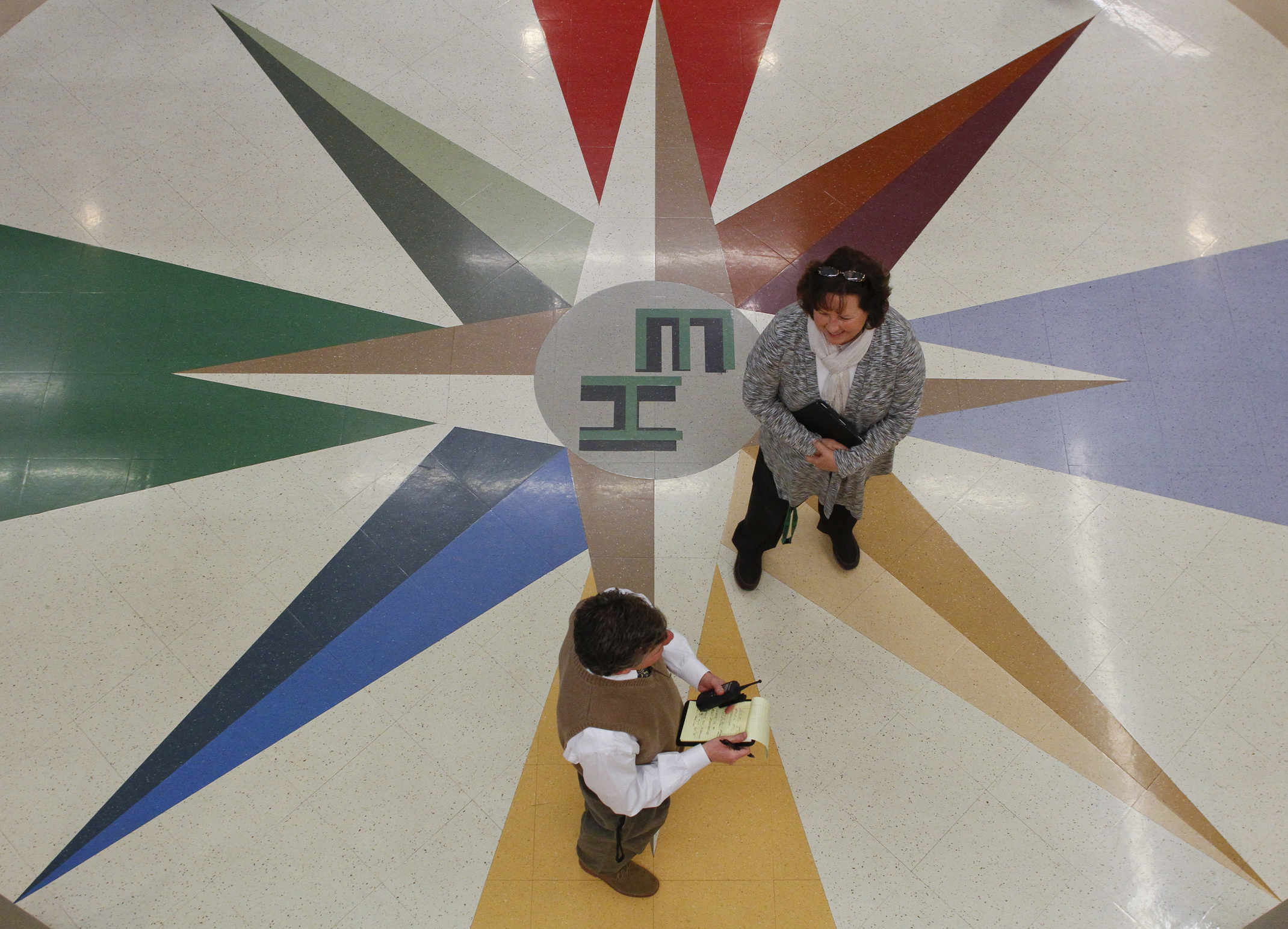These days, the principal's office is likely the last place you'll find a school principal.
That's because they're spending more of the school day in the classroom, closely observing, critiquing and coaching teachers on their methods.
New accountability models, heightened standards and changed evaluation schemes are not only making the principal's job more complex, but also are forging an entirely different focus for the job.
No longer is the principal's role here believed to be one of mainly discipline and management. It's increasingly academic.
Principals are expected to stay up to date on the latest educational research, stay in tune with ever-changing teaching standards and play a larger role in curriculum development and programming. They're expected to be data experts, to boost student test scores and to find ways of closing decades-old achievement gaps.
These changes are rolling out as society demands more of its schools and national and state officials continue to rewrite the very definition of what constitutes a good education.
Yet the traditional management responsibilities remain. There are budgets to balance, meetings to attend and fights to break up. Parents still show up and call throughout the day. Water leaks, fire drills and even bomb threats call for quick action. And buses, bells and lunch periods still need to run on time.
The ability to embrace the new role is critical to improving students' academic performance, Superintendent Rick Smith says, and parents and community members need to change their expectations of the position. Yet shedding the traditional idea of what a principal should be is easier said than done.
And with all those distractions, some are skeptical that principals can ever give their full attention to academics.
•••
Ultimately, redefining the pral's job is all about boosting student performance.
In Hamilton County, fewer than half of elementary students read on grade level, according to the 2012 Tennessee Report Card. In high schools, six of 10 students didn't meet the state standard in algebra last year. Achievement gaps are wide, with poor students scoring about 30 percent worse in math than their better-off peers.
The concept that principals should lead an academic push has been more than a decade in the making. Academic journals have called for this change for more than 30 years. Only in the past few years have many school districts across the country started rewriting job descriptions.
And in Hamilton County, the superintendent, a former principal, is making this redefinition and focus a cornerstone of his tenure.
Smith thinks principals have the most critical job in the school district and are best suited to usher in changes in student performance.
Focusing on the day-to-day churn and management tasks might show immediate gains in a smoother school day. But principals who throw their efforts into improving what's going on in the classroom can leverage more powerful long-term change in reading levels and math scores.
"We can't have principals being everything for everybody," Smith said. "We've got to re-educate ourselves and the community."
•••
With four assistant principals at her side, East Hamilton's Chuy can delegate some tasks. The five share discipline and take turns covering ball games. But she still has ultimate responsibility.
When the building's finicky alarms go off in the middle of the night, she must drive to the school, meet the police and wait for them to sweep the entire building. Chuy is still accountable for the books and must sign off on each purchase order.
"While these jobs still have to be done, principals have to move beyond that," said Chuy, a veteran educator of more than 30 years.
So Chuy intentionally puts off paperwork several days a week and hits the hallways. She sits in on classes, gets acquainted with teachers' styles and offers feedback on how they're doing. Even with subjects she's not familiar with, like physics or Spanish, Chuy must find ways to assess and improve instruction.
In addition to completing hundreds of classroom observations each year, principals and assistant principals also are taking part in teacher planning and training. They're ushering in the shift to the more rigorous and universal Common Core teaching standards and are leading the charge of putting technology into the hands of students.
All those duties mean that the very selection of principals looks different now.
"You're not just looking for a manager anymore," said Hunter Middle School Principal Robert Alford.
To gain teachers' respect, Alford believes principals must be more than just an authority figure. To become an instructional expert requires a great deal of time alongside teachers and students in the classroom.
"If I had my way, that's where I'd be all day long," Alford said.
•••
Under the 2002 No Child Left Behind law, accountability at the school level became a federal mandate and principals had to answer to higher powers than just the superintendent. In more recent years, reform efforts have heightened standards in Tennessee and other states as the nation's expectations of its schools continued to evolve
"That necessitates change in leadership," said Joseph Murphy, the Frank W. Mayborn chair and associate dean for special projects at Vanderbilt University's Peabody College. "You can't lead the way you used to lead because the game has changed."
In the past, teachers were often left alone to run their classrooms, Murphy said. Principals focused mainly on holding conflict levels low and keeping the wheels of the school day in motion. The expectations of both jobs have now changed.
Murphy, who has worked on training some of Hamilton County's teachers, is all for the renewed focus on academics. Many believe it's what principals should have been doing all along.
But he said the principal's job just isn't set up to allow for much classroom time.
Plus, Murphy said principals have historically been tasked with building positive relationships with their communities. So they can't stay confined to the classroom.
"Part of the job is visibility and pressing flesh," Murphy said. "And you can't do that if you're not in the public forum."
That's especially pointed in Hamilton County as principals often try to build relationships with parents, community groups and businesses to help fill funding and support gaps. The county gives limited funds to schools outside salary, maintenance and utility payments.
At Hunter Middle School, for instance, the district provides about $15,000 annually. But the school's bills -- which include phone bills, copy paper and other supplies -- can exceed $4,000 a month.
So principals often must pursue grants, seek donations or hold fundraisers to fill the void.
Ultimately, principals say they try to find a way to fulfill both missions.
Their attendance at evening activities is likely to continue. And they will no doubt deal with parents who show up or call in with complaints. But they say they are finding ways to delegate.
That might mean that a school secretary now plays a larger role in fielding calls and visits. Or the principal may lean more on the school bookkeeper when it comes to overseeing the budget. And assistant principals and teacher leaders may be tapped more to share in the making of schedules, the running of meetings and discipline issues.
"I think principal time spent on instructional leadership is ultimately going to be a higher-impact strategy than dealing with every single disciplinary problem, every single basketball game and every single financial decision," said Red Bank High School Principal Justin Robertson.
"At the end of the day, there are plenty of people at the school who can handle those kinds of situations."

